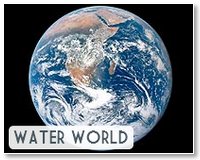| . |  |
. |
Jerusalem (AFP) May 12, 2011 Israel has systematically exploited the resources of the Jordan Valley in the occupied West Bank, favouring settlers over Palestinians, a report by Israeli rights group B'Tselem found on Thursday. Entitled "Exploitation and Dispossession," the report found Israel dominated the land, water resources and even tourist sites along the strip of land which runs along the eastern flank of the West Bank, in what appeared to be a prelude to a de facto annexation of territory. "Israel has instituted a regime that massively exploits the resources of the Jordan Valley and the northern Dead Sea, far more than elsewhere in the West Bank, demonstrating its intention: to de facto annex the area to the state of Israel," the rights group said. "Israel has taken over most of the water sources in the area, allocating almost all derived water to settlements," it said, charging that such actions violated international law, which prohibits the exploitation of natural resources within an occupied territory. B'Tselem said the 9,400 Jewish settlers living there were able to develop intensive agriculture because they received an annual water allocation of 45 million cubic metres -- almost a third of the quantity accessible to the West Bank's 2.5 million Palestinian residents. "This generous water supply has enabled settlements to develop intensive-farming methods and to work the land all year round, with most of the produce being exported," it said. At the same time, Israel's control of water sources in the area had depriving Palestinian farmers who had been forced to cut back. "Due to the water shortage, Palestinians have been forced to neglect farm land that used to be cultivated and switch to growing less profitable crops," the report's authors wrote. The study reviewed various measures used by Israel to take control of 77.5 percent of land in the Jordan Valley by declaring large swathes to be military firing zones, nature reserves or to be under state control. Israel had also taken over most of the major tourist attractions in the area, such as the northern shores of the Dead Sea, the Qumran caves where the Dead Sea Scrolls were found and the springs on the Ein Fashkha reserve, allowing private Israeli businesses to profit from mineral extraction and tourism. The report was hailed by Dr Shadad Attili, head of the Palestinian Water Authority who said the disparity in water allocation was a clear example of the "systemic inequalities" taking place under Israel's occupation. "The Jordan Valley serves as a microcosm of what is going on across the occupied Palestinian territory when it comes to Israel's systematic exploitation of Palestinian water resources in violation of international law," Attili said in a statement, accusing Israel of using water "as a weapon to target some of the most vulnerable" Palestinians. "Restrictions imposed by Israel on the amount of water Palestinians can access are part of a deliberate policy designed to put additional pressure on struggling Palestinian communities to leave their land," he charged. The Jordan Valley, which was captured by Israel during the 1967 Six Day War along with the rest of the Palestinian territories, spans 1.6 million dunams and makes up 28.8 percent of the West Bank. Statistics in the report show it is home to 65,000 Palestinians living in 29 communities, and around 15,000 Bedouins, while 9,400 settlers live in 37 settlements in the area (seven of them wildcat outposts). Last month, Israeli Prime Minister Benjamin Netanyahu told AFP the Jewish state would insist on maintaining troops in the Jordan Valley in any peace agreement with the Palestinians, saying it would be crucial for Israel's future security. But Palestinian president Mahmud Abbas completely rejected the idea, telling AFP last month that such a troop presence would torpedo the possibility of an independent state, and would effectively destroy his Palestinian Authority.
Share This Article With Planet Earth
Related Links Water News - Science, Technology and Politics
 Iran expert alarmed by 'critical' Caspian Sea pollution
Iran expert alarmed by 'critical' Caspian Sea pollutionTehran (AFP) May 12, 2011 The level of industrial and oil pollution in the Caspian Sea has reached a "critical condition," an Iranian ecological expert warned, quoted by local media on Thursday. "In terms of pollution, the Caspian Sea is in critical condition," Reza Pourgholam, head of the Caspian Sea Ecological Research Institute, told Fars news agency. Exploitation of oil fields and traffic of large oil tankers ... read more |
|
| The content herein, unless otherwise known to be public domain, are Copyright 1995-2010 - SpaceDaily. AFP and UPI Wire Stories are copyright Agence France-Presse and United Press International. ESA Portal Reports are copyright European Space Agency. All NASA sourced material is public domain. Additional copyrights may apply in whole or part to other bona fide parties. Advertising does not imply endorsement,agreement or approval of any opinions, statements or information provided by SpaceDaily on any Web page published or hosted by SpaceDaily. Privacy Statement |